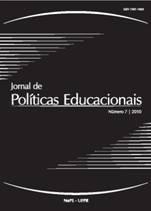Brazil’s ‘lost decade’ in education, 1985-1994: how to account for the lack of reform in the New Republic?
DOI:
https://doi.org/10.5380/jpe.v4i7.21858Palabras clave:
Military period (1964-85), New Republic (1985-94), education and politicsResumen
Brazil’s education system is seen as having undergone substantial reform since 1995, ten years after the country returned to democracy. What were the reasons for the delay in reform during this ‘lost decade’ in education between 1985 and 1994? The paper identifies the reasons, including the educational legacy left by the outgoing military regime (including commitments it was unable to achieve, distortions in its spending allocation and the relative absence of control over the private sector); the political instability of the new republic’s first governments and increasing decentralisation of its political institutions; and the development of the education sector as an increasingly politicised arena of contestation between left and right, which would persist into the reform period after 1995. The paper concludes by questioning whether this cycle of political instability and contestation in education has reached an end with the entry of the PT into government in 2003.Descargas
Cómo citar
Número
Sección
Licencia
Autores que publicam nesta revista concordam com os seguintes termos:
a) Os autores mantêm os direitos autorais e concedem à revista o direito de primeira publicação, com o trabalho simultaneamente licenciado sob a Creative Commons Attribution License que permite o compartilhamento do trabalho com reconhecimento da sua autoria e publicação inicial nesta revista.
b) Os autores são autorizados a assinarem contratos adicionais, separadamente, para distribuição não exclusiva da versão publicada nesta revista (por exemplo, em repositórios institucionais ou capítulos de livros), com reconhecimento da sua autoria e publicação inicial nesta revista).
c) Os autores são estimulados a publicar e distribuir a versão onlline do artigo (por exemplo, em repositórios institucionais ou em sua página pessoal), considerando que isso pode gerar alterações produtivas, bem como aumentar o impacto e as citações do artigo publicado.
d) Esta revista proporciona acesso público a todo o seu conteúdo, uma vez que isso permite uma maior visibilidade e alcance dos artigos e resenhas publicados. Para maiores informações sobre esta abordagem, visite Public Knowledge Project, projeto que desenvolveu este sistema para melhorar a qualidade acadêmica e pública da pesquisa, distribuindo o OJS assim como outros softwares de apoio ao sistema de publicação de acesso público a fontes acadêmicas.
e) Os nomes e endereços de e-mail neste site serão usados exclusivamente para os propósitos da revista, não estando disponíveis para outros fins.
English version:
Authors who publish at JPE agree to the following terms:
a) The authors retain the copyright and grant JPE the right to first publication, with the work simultaneously licensed under the Creative Commons Attribution License that allows the sharing of the work with recognition of its authorship and initial publication in this magazine.
b) Authors are authorized to sign additional contracts, separately, for non-exclusive distribution of the version published in JPE (for example, in institutional repositories or book chapters, with acknowledgment of their authorship and initial publication at JPE).
c) Authors are encouraged to publish and distribute the online version of the article (for example, in institutional repositories or on their personal page), considering that this can induce the science, as well as increase the impact and citations of the published article.
d) This journal provides public access to all of its content, as this allows greater visibility and reach of published articles and reviews. For more information on this approach, visit the Public Knowledge Project, a project that developed this system to improve the academic and public quality of research, distributing OJS as well as other software to support the publication system of public access to academic sources.
e) The names and e-mail addresses on this website will be used exclusively for the JPE purposes, and will not be available for other purposes.
Versión en Español
Los autores que publican en esta revista aceptan los siguientes términos:
a) Los autores conservan los derechos de autor y otorgan a la revista el derecho de primera publicación, con la obra licenciada simultáneamente bajo la Creative Commons Attribution License que permite compartir la obra con reconocimiento de su autoría y publicación inicial en esta revista.
b) Los autores están autorizados a firmar acuerdos adicionales, por separado, para la distribución no exclusiva de la versión publicada en esta revista (por ejemplo, en repositorios institucionales o capítulos de libros), con reconocimiento de su autoría y publicación inicial en esta revista).
c) Se alienta a los autores a publicar y distribuir la versión en línea del artículo (por ejemplo, en repositorios institucionales o en su página personal), considerando que esto puede generar cambios productivos, así como aumentar el impacto y las citas del artículo publicado.
d) Esta revista brinda acceso público a todo su contenido, ya que esto permite una mayor visibilidad y alcance de los artículos y reseñas publicados. Para obtener más información sobre este enfoque, visite Public Knowledge Project, un proyecto que desarrolló este sistema para mejorar la calidad académica y pública de la investigación, distribuyendo el OJS, así como otro software para respaldar el sistema de publicación de acceso público para fuentes académicas.
e) Los nombres y direcciones de correo electrónico en este sitio serán utilizados exclusivamente para los fines de la revista, no estando disponibles para otros fines.

This work is licensed under a Creative Commons Atribution 4.0 International.



